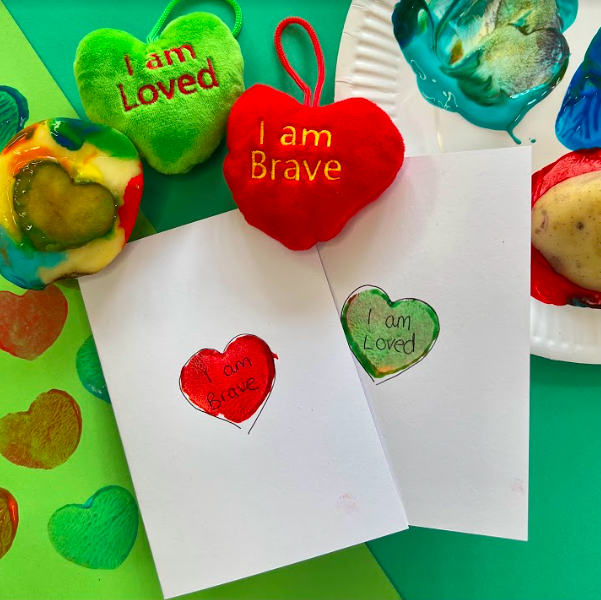A child’s development needs to be continually monitored and developed throughout their life. Babies are assessed frequently in the first few years of their life for physical growth. When children go to school, academics can become more important. At this stage in their lives, change is frequent and their world opens up in new ways. New environments need to be understood, as children spend time away from their family and home. They make new attachments to other caregivers. Children mix more with their peers and experience less adult supervision. This is all a lot for young children to adapt to and their emotional wellbeing is rarely monitored.
With children continually trying to cope with new experiences on a day-to-day basis, and the emotional waves coming and going, they learn to cope, adapt and build skills to help them through.
Struggles in life can often come from not having the skills to cope. If a child lacks self-belief or doesn’t feel worthy or deserving, they will struggle to cope with life’s difficulties. To be positive and excited about the future, motivated, and optimistic, it is important that your child knows they are worthy and deserving of good things. Showing your child that you are pleased for them, proud of their achievements (however small), and reminding them that they are loved, are all good ways of achieving this. But you might also notice they still struggle at times.
Even if we think our child is coping well, checking in with them to understand their perspective on their experiences helps them to express their difficulties. Children continually face new life experiences and challenges, both alone and in groups. They each experience things differently with some children managing to cope with change, social environments, and emotions. They appear to deal with life outside of the home well, whereas others need more support. Some are loud and clear when they are struggling, others are quieter and can withdraw.
It can be tough out there, and children don’t always want to tell us what is going on.
Knowing that young children take things literally can sometimes help us to understand why they are upset. If they experience negativity or criticism from their peers, or feel their teacher doesn’t like them, they will believe what they think. They are too young to rationalise; words, jokes, or behaviour. By helping your child to see different perspectives, explaining jokes to them or helping them to see that people say things for all sorts of reasons, they will begin to understand the subtle intentions of people, and how communications can be misunderstood. All of this will support them to take things less to heart or feel that they beneath anyone else.
Situations with our children can sometimes trigger us because of our past experiences. Being self-aware at these times is crucial when dealing with children and their development. It can help us to separate ourselves from the situation to focus on the child. Decisions are then made that support and comfort them rather than isolate or punish them. This will help rather than hinder their emotional development as they continue to feel safe. They will worry less about whether or not they have upset you for things that are beyond their ability to understand.
Become your child’s developmental detective and investigate what is going on for them. When things arise in your child that seem unusual or uncomfortable for them, ask yourself questions to assist you to delve into what is going on for them.
Example:
What do I need to do to help my child conquer their difficulty and feel good about themselves?
Tips for helping monitor your child’s ongoing development:
Focus on one thing at a time, keeping it short and age-appropriate: young children can’t cope with too much information, it will start to go over their heads and the learning will get lost. If they want more information, they will ask you questions.
Empathise to show you are trying your best to understand them: suggest that you know things are a bit different for them and enquire as to how it might be making them feel.
Share stories similar to their current difficulty to help ease their discomfort: if you remind them of a similar time when they felt this way, but it turned out well, it will really help them to reduce their anxiety. For example, ‘remember when you first stayed over at grandmas and you thought I wasn’t coming back…’
Provide support and comfort to encourage them to express their feelings: sharing your experiences and asking them to share theirs allows you to monitor their emotional development and how well they are coping.
Reassure to build their self-belief: point out that you’ve noticed what they can do, and that you are available to help them. It will encourage them to keep trying new things with confidence.
Discuss what might help them with their struggles: allowing them to come up with ideas of their own will empower them to take on challenges. You can also provide scenarios and ask them what they would do to problem solve.
Encourage patience to diffuse high emotions about situations that may naturally pass: you can explain to them that sometimes there are just difficult days and that not every situation needs a reaction or a lot of attention. Ask them to report back if things continue, to avoid dismissing their experience, but encourage them to take time sometimes.
If your child is experiencing difficulties with another child, here are some helpful words for them to attempt to deal with it themselves first:
- Let’s see how it goes tomorrow, they may have had a bad day like you and apologise or calm down tomorrow
- If they are mean to you again, we can talk about what we can do about it together
- Ask your child what was said, and when they tell you, ask them what they think and feel about it
- Remind them that just because someone says something, it doesn’t mean that it’s true.
3 Take aways:
A child’s development needs to be continually monitored and developed throughout their life.
Knowing that young children take things literally can sometimes help us to understand why they are upset.
Become your child’s developmental detective and investigate what is going on for them.
Reflection:
What questions can you ask your child to monitor how they are?




